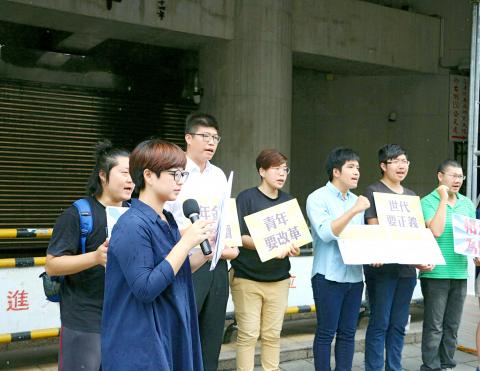Representatives from a coalition of young people’s groups voiced their support for pension reform in Taipei yesterday.
The group called for “generational justice” and equal treatment for people from all occupations, adding that young people are unfairly shouldering the financial burden of public pensions.
Jennifer Lu (呂欣潔), an executive for the Social Democratic Party, said that the viewpoints of the younger generation are not being heard at government meetings.

Photo: CNA
“I have many young adult friends around me who are civil servants, public-school teachers, or enlisted in the military, but they support the government’s drive for pension reform,” Lu said. “However, they are afraid to speak out due to pressure from their superiors.”
“Many young adults doubt that they can receive pensions in the future, even though they have paid into the system,” Lu said. “They worry that they have to pay now, but when they retire, they would have to face a bankrupt nation.”
Hsu Tzu-wei (徐子為), head of National Chengchi University’s graduate students association, said that public-school teachers receive on average NT$68,000 in monthly pensions, while workers in most other occupations only receive at most NT$16,000 per month.
“Our society has belatedly discovered that the pension system and working rights are unfair to private-sector employees,” Hsu said. “Pension reform is not a ‘class struggle’ against groups in higher wage levels. We just want to achieve reform so that private-sector employees have the same pensions as civil servants, teachers and military personnel.”
The government must be more prudent in its spending, he said, adding that it must find other revenue sources, so the pension system can be stabilized, easing the financial burden on young workers who have to support retirees.
Chen Chia-hsin (陳佳菁), president of the National Yang Ming University student union, said problems with the pension system have a historical and institutional background, and proposed reforms are not aimed at any particular group as some have claimed.
“Spending is allocated unevenly, for which the younger generation has to shoulder the financial burdens of the future,” Chen said. “We want the government to carry on dialogue with all sectors of society to make the pension system fair, equitable and sustainable.”
Wu Yun-ching (吳昀慶), head of National Taiwan University’s graduate students association, said statistics show that the nation’s “old-age dependency” ratio is at 5.6, meaning one person aged 65 or more is dependent on the financial contributions of 5.6 working adults.
“However, the ratio will be reduced to 2.2 within the next 20 years,” Wu said. “Taiwan will become an impoverished society. Therefore we must discuss the fair distribution of financial resources right now.”
Yao Chieh-hsiang (姚介祥), a figure in the Sunflower movement, said Taiwan risks bankruptcy, so Taiwanese should tighten their belts and face the hardship together.
“Those people protesting today [yesterday] ... should understand that they are also a part of this nation,” Yao said. “They should not see reform as a punishment.”

AIR SUPPORT: The Ministry of National Defense thanked the US for the delivery, adding that it was an indicator of the White House’s commitment to the Taiwan Relations Act Deputy Minister of National Defense Po Horng-huei (柏鴻輝) and Representative to the US Alexander Yui on Friday attended a delivery ceremony for the first of Taiwan’s long-awaited 66 F-16C/D Block 70 jets at a Lockheed Martin Corp factory in Greenville, South Carolina. “We are so proud to be the global home of the F-16 and to support Taiwan’s air defense capabilities,” US Representative William Timmons wrote on X, alongside a photograph of Taiwanese and US officials at the event. The F-16C/D Block 70 jets Taiwan ordered have the same capabilities as aircraft that had been upgraded to F-16Vs. The batch of Lockheed Martin

GRIDLOCK: The National Fire Agency’s Special Search and Rescue team is on standby to travel to the countries to help out with the rescue effort A powerful earthquake rocked Myanmar and neighboring Thailand yesterday, killing at least three people in Bangkok and burying dozens when a high-rise building under construction collapsed. Footage shared on social media from Myanmar’s second-largest city showed widespread destruction, raising fears that many were trapped under the rubble or killed. The magnitude 7.7 earthquake, with an epicenter near Mandalay in Myanmar, struck at midday and was followed by a strong magnitude 6.4 aftershock. The extent of death, injury and destruction — especially in Myanmar, which is embroiled in a civil war and where information is tightly controlled at the best of times —

China's military today said it began joint army, navy and rocket force exercises around Taiwan to "serve as a stern warning and powerful deterrent against Taiwanese independence," calling President William Lai (賴清德) a "parasite." The exercises come after Lai called Beijing a "foreign hostile force" last month. More than 10 Chinese military ships approached close to Taiwan's 24 nautical mile (44.4km) contiguous zone this morning and Taiwan sent its own warships to respond, two senior Taiwanese officials said. Taiwan has not yet detected any live fire by the Chinese military so far, one of the officials said. The drills took place after US Secretary

THUGGISH BEHAVIOR: Encouraging people to report independence supporters is another intimidation tactic that threatens cross-strait peace, the state department said China setting up an online system for reporting “Taiwanese independence” advocates is an “irresponsible and reprehensible” act, a US government spokesperson said on Friday. “China’s call for private individuals to report on alleged ‘persecution or suppression’ by supposed ‘Taiwan independence henchmen and accomplices’ is irresponsible and reprehensible,” an unnamed US Department of State spokesperson told the Central News Agency in an e-mail. The move is part of Beijing’s “intimidation campaign” against Taiwan and its supporters, and is “threatening free speech around the world, destabilizing the Indo-Pacific region, and deliberately eroding the cross-strait status quo,” the spokesperson said. The Chinese Communist Party’s “threats